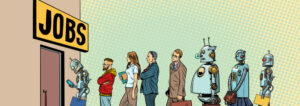Trends in tech that will impact the world in 2019
- 5 Min Read
New research from Hays has revealed the biggest advancements in tech this year, and the impact this could have on HR.
- Author: Louron Pratt
- Date published: Jan 21, 2019
- Categories

With the influx of new technology being implemented in the world of work. This means that there are increasingly more tools available for HR professionals to utilise to increase efficiency and effectiveness. However if HR leaders are to maximise their chances of grasping these opportunities, it’s important for them to anticipate these.
Through research from Hays, they found that these were the top tech trends that could have a significant impact in 2019.
 Jacky Carter, Group Digital Engagement Director at Hays, says, “The volume and velocity of HR-based technology making its way into the marketplace in the last few years has been, at times, overwhelming. Having this wealth of technological tools to choose from means having the necessary tech skills available is crucial. Many of those in HR leadership roles probably didn’t have technology high on their own skillset – but that is rapidly changing.”
Jacky Carter, Group Digital Engagement Director at Hays, says, “The volume and velocity of HR-based technology making its way into the marketplace in the last few years has been, at times, overwhelming. Having this wealth of technological tools to choose from means having the necessary tech skills available is crucial. Many of those in HR leadership roles probably didn’t have technology high on their own skillset – but that is rapidly changing.”
Learning as a skill
With technology advancing, this opens up a number of skills for the world workforce to be involved in. With many employees changing from job to job as it is already. As more opportunities open up through technology, this could mean that learning will become an even more crucial aspect of work if employees want to keep up with the pace of new technologies and working styles.
Jacky explains, “Those organisations who want to retain their good talent – and most of them will – need to think about how they are offering their employees the channels in-house that ensure they are able to upskill and reskill themselves. These channels need to accommodate micro or bite-sized as well as macro learning – with the former being heavily driven by video-based content. Employers who recognise this will win in the talent stakes”.
Messaging, communication and collaboration
With the rise in social media platforms, as well as applications purely dedicated to messaging such as WhatsApp, we could see email and calls to decline. And applications such as Skype and slack to increase in popularity as a much more instant and easy to use device. Jacky says, “The reality is that many of us want or expect to have the choice to interact on messaging platforms – meaning communication via old tools such as telephones has become outdated. Employees are no different – we are seeing the emergence of chat as a way to self-serve on HR issues as well as handling high volume applications as people like talking less and less until there is a level of trust established and personal interaction is likely to add some value.
Automation
Automation is an aspect of work that is still fairly new, however, we have already seen it dominate the conversation. And already have a unique influence in the job market. It’s important for HR leaders to communicate these advantages to their workforce, as well as potentially adopt some of these new technological changes. A survey by CIPHR found that 58% of HR professionals expected to see these changes happen in 2018. With 86% expecting to focus on this in the next 12 months. Abd with PwC predicting that 30% of existing jobs in the UK could face automation in the next 15 years, this is a trend that most certainly needs to be addressed this year.
Employee experience
Employee experience is becoming more of an important subject into today’s age, this has been said to improve employee engagement and productivity. Through technology, we have seen huge shifts in how companies handle this, as if an employee has a positive experience then they are likely to retain their workforce. Companies such as Humanize are even using biometric badges that track employees around the office to track their happiness. With these changes becoming more accessible to the wider workforce. This is something to look out for in the year.
The Deloitte Human Capital Trends 2017 study states that: “Consider your employee your number one stakeholder. They, in turn, will take care of your customers, who in turn will take care of your shareholders”.
 Data and Analytics
Data and Analytics
In addition to the experience of employees, it is becoming more apparent that data and analytics are crucial to the successes of a business. Jacky mentions that “If retention and attraction of the best talent become more and more critical to an organisations’ ability to deliver results, knowing how effective each measure has been in real time will enable them to fine-tune their approach and ultimately be more successful in their hiring process for example.”
Culture
With this technological shift in place, it’s important that there is a positive culture around these changes. HR leaders need to communicate these changes to their work environment. To ensure a level of transparency, to enable an environment of openness, collaboration and flexibility as well as incorporating transparency and “voice of the customer” into the design, be those customers internal or external. HR leaders have a key role to play in driving and facilitating a culture that embraces and embeds change into the fabric of the organisation, in a way that maximises the positive impact of any new technology. Danielle Harmer, Chief People Officer at Metro commented on this changing culture “The scepticism of employees not wanting this change is the way we describe the benefits of it.”
Jacky concluded by saying, “In the world of work the array of technology that is available and emerging is staggering. To make it work for you, it really is a case of finding solutions to the problems you’d like to solve and keeping that in focus rather than trying to work all the tools available into your processes – think of it as an à la carte menu rather than an all-you-can-eat buffet!”









